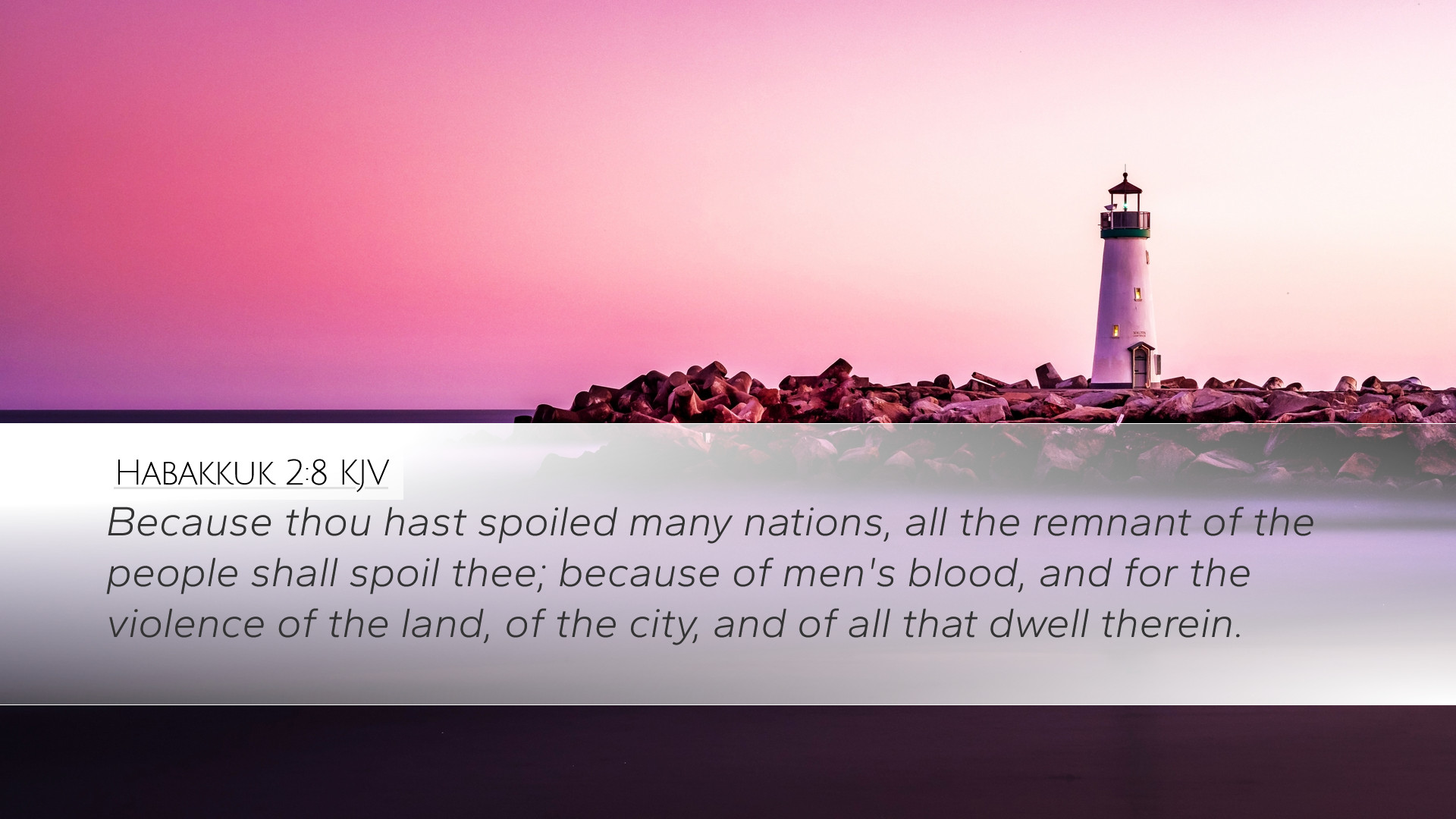Old Testament
Genesis Exodus Leviticus Numbers Deuteronomy Joshua Judges Ruth 1 Samuel 2 Samuel 1 Kings 2 Kings 1 Chronicles 2 Chronicles Ezra Nehemiah Esther Job Psalms Proverbs Ecclesiastes Song of Solomon Isaiah Jeremiah Lamentations Ezekiel Daniel Hosea Joel Amos Obadiah Jonah Micah Nahum Habakkuk Zephaniah Haggai Zechariah MalachiHabakkuk 2:8
Habakkuk 2:8 KJV
Because thou hast spoiled many nations, all the remnant of the people shall spoil thee; because of men's blood, and for the violence of the land, of the city, and of all that dwell therein.
Habakkuk 2:8 Bible Commentary
Commentary on Habakkuk 2:8
Verse: "Because thou hast spoiled many nations, all the remnant of the people shall spoil thee; because of men's blood, and for the violence of the land, of the city, and of all that dwell therein." (Habakkuk 2:8, KJV)
In this verse, the prophet Habakkuk addresses the judgment that will come upon Babylon due to their oppression and violence. This commentary will draw insights from the revered public domain commentaries of Matthew Henry, Albert Barnes, and Adam Clarke to unfold the rich theological and practical implications of this text. This synthesis seeks to be meaningful to pastors, students, theologians, and Bible scholars.
Contextual Analysis
Habakkuk stands as a unique voice among the prophets, grappling with the issues of divine justice in a world that appears unjust. As the Chaldeans (Babylonians) rise in power, Habakkuk questions the efficacy of God's plans. This verse, located in a passage where the Lord outlines the fate of the arrogant, provides deep insight into the consequences of sin and the ultimate justice of God.
Theological Insights
Divine Justice
Matthew Henry highlights that God's judgments are built on a foundation of justice. Babylon's plundering of nations will not go unpunished; in fact, their own violence will lead to their destruction. This cyclical nature of violence is emphasized—whatever one sows, that shall they also reap (Galatians 6:7).
Moral Accountability
Albert Barnes asserts that the powerful have a moral obligation to govern with justice. Babylon’s exploitation of weaker nations serves as a striking example of moral failure. The violence and bloodshed they inflicted on other peoples will ultimately rise against them and lead to their downfall.
God’s Sovereignty
Adam Clarke points out that God's plans are sovereign and cannot be thwarted by human malice. Babylon, despite its supreme power, operates within the limits set by God. Their arrogance blinds them to the impending consequences of their actions, emphasizing that all power is accountable to a higher authority.
Exegesis of Key Phrases
“Thou hast spoiled many nations”
This phrase highlights Babylon’s expansive opportunism. Matthew Henry elaborates on their ruthless conquests and the desolation that followed. This serves as a stark reminder of the destructive nature of unchecked power.
“All the remnant of the people shall spoil thee”
This promise of retribution indicates a reversal of fortunes. Albert Barnes emphasizes that the very nations that were victimized will eventually rise against Babylon, reflecting the biblical principle that those who oppress will themselves be oppressed. It serves as an encouragement to victims of injustice, assuring them of divine vindication.
“Because of men’s blood”
The mention of blood signifies the severity of the crimes committed by Babylon. Adam Clarke interprets this as a reference to both literal violence and the spiritual ramifications of their actions. The shedding of innocent blood correlates closely with the divine outcry for justice.
Application for Today’s Believers
This ancient text remains profoundly relevant. The Church today is called to reflect on the implications of this verse concerning social justice, the moral responsibilities of power, and the hope of divine justice.
Reflection on Justice
As contemporary followers of Christ, believers must comprehend the weight of justice. Habakkuk's lament encourages us to take seriously the inequities present in our societies. Matthew Henry urges us to act with integrity and stand against systemic injustices, recognizing the ripple effects of our actions.
The Perils of Pride
The study of Babylon’s fall serves as a cautionary tale against pride and arrogance in leadership. Albert Barnes reminds us that power devoid of humility and righteousness ultimately leads to ruin. Leaders today, whether in politics or church, must exercise their authority in ways that align with God’s justice.
Hope in Divine Retribution
For those who suffer under injustice, the promise of retribution offers profound hope. Adam Clarke posits that God is aware of every wrong and will set all things right in due time. Believers can draw strength from this assurance, knowing that God’s eye is on the oppressed.
Conclusion
Habakkuk 2:8 serves as a powerful reminder of God’s justice, the perils associated with prideful oppression, and the hope that comes from God’s sovereign oversight of history. As we reflect on these profound truths, may we be inspired to uphold justice, act with humility, and trust in God's ultimate plan for righteousness. In the spirit of the prophet Habakkuk, we can confidently maintain our faith in God's justice amid a world fraught with violence and exploitation.


